 |
 |
 |
|
|||
|
Echoes of Ancient Myth in Crete When you get an assignment like this, you don't want to sound too excited. So when I got the call to travel to Greece for The Savvy Traveler, I said something like, "Sounds good. I think I can fit it in as soon as I finish up a sound portrait of the Silk Road." Then preparing for the trip, it was a great excuse to brush up on my mythology. I couldn't think of a better companion for this quest then my friend, Phil Metzidakis, a photographer whose family comes from Crete. He could document the trip in pictures, and with three years of Greek lessons under his belt, be an interpreter, too. When I asked Phil and he said, "Sure, just as soon as I'm done tracking the footsteps of the Pharaoh's", I knew exactly where he was coming from. Crete is the largest of the Greek Islands, and it lies on the southernmost portion of the Aegean Sea, about a forty-five minute plane ride or an overnight ferry trip from Athens. The island's rugged terrain and the Cretan's fiercely independent spirit have contributed to keeping much of this place relatively unspoiled. 
After we land in Crete, rent a car and hit the back roads, one of the first sounds we hear is a herd of goats or sheep, each with a bell around its neck, being taken to pasture. That's a sound we would encounter again and again across the island, an echo of ancient times and a reminder we're on the trail of the gods. After all, it was here on Crete that Zeus, lord of Olympus, was born in a cave. Now, thousands of years later, busloads of people visit the Dikteon cave, every day. Although it's mentioned in most guidebooks, there are virtually no road signs for this place. As we wend our way along backroads, Phil has plenty of opportunity to practice his skill in asking directions and receiving the Cretan equivalent of "You can't get there from here." People would ask where Phil was from, and where he learned to speak Greek, and on a number of occasions, they invite us into their home for a cup of tea or coffee Resuming our journey, we arrive at 4 pm, only to discover that the cave closed at 2:30 and no official letters of introduction from The Savvy Traveler, no microphones or other subtle forms of coercion can persuade them to let us in. So, wondering if we are being tested by the gods, we return the following day. The parking lot is full of tourist buses and cars. We trudge up the stone steps, which have been smoothed by thousands of visitors who have hiked the 3/4-mile pathway to the cave. You can hire a donkey for the journey. 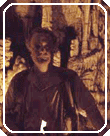
Nestled in the mountains, surrounded by trees and bushes, the entrance is well hidden, but big enough to drive a bus through. We pay our fee, listen to the birds that nest at the cave's entrance, and head down a wooden staircase. It would be pitch black inside if not for electric lights, and you can imagine how in ancient times the flickering of torches would have played amidst the countless stalactites and stalagmites here, causing shadows to jump and dance, awakening the imagination and feeling the connection to a primordial, mythological time. In this cave, Baby Zeus was fed milk from a goat's horn, which has come to be known as the Cornucopia, the horn of plenty. Warriors guarded the newborn god. Today, the Cornucopia has given way to cameras and the odd exclamation of a weekend warrior.
Phil: "It's cold in here! It's like a fridge!" On the way out, the ticket seller who recognizes us from yesterday, stops to give us two glasses of raki, the local home brewed firewater, and a dish of almonds. It's a peace offering. He felt badly about not being able to let us in the day before. There's something about this gesture that touches both Phil and me, as if, in a small moment of reconciliation, we are entering into the spirit of Crete. On the way down the path, we strike up a conversation with Nicholas, a former New York City taxi driver who now leads tourists on donkeys to the Dikteon cave.
Jim: "Do you feel any connection with the ancient gods?" 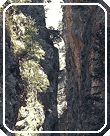
So, as we left the cave, I got to thinking about who or what the gods might be. In these monotheistic times, we tend to dismiss the Greek pantheon as paganism incarnate or perhaps the cast of characters in some colorful bedtime stories. And yet, we spend our days virtually worshipping in front of glowing rectangular screens, making obeisance to such entities as Software Giants and Industrial Titans. Our gods may be lurking close at hand, waiting to be discovered as a lingering, living metaphor. So in an effort to invoke the spirit of the ancient Olympians, Phil and I decide to indulge in a venerable Hellenic pastime declamation. Ringed by beautiful beaches, Crete is a mountainous country, home of several famous gorges, one of which is called Kroutaliotiko Faragi, the clapping gorge, in honor of its echo. Sheer cliffs rise up hundreds of feet on either side of a stream. It's the ideal spot to try out a little Homer.
Phil and Jim: "Olympian Zeus!" After several days of following in the footsteps of the deities, even visiting the site of the ancient Minoan palace of Knossos, Phil and I concluded that only actors, academics, archaeologists and tourists still sound the names of the gods and it's a faint echo at best. The idea sounded good on paper, but here on Cretan soil, we're pulled in the direction of a more living tradition. With a bit of searching, you can still find it in the hills. After contacting the Ministry of Culture and Tourism, Phil and I are invited to Karanos, a tiny village in the mountains of western Crete, where they're celebrating the cherry harvest. But first, the local priest gives a blessing and several of the older men sing. Orthodox Christianity is the religion of contemporary Greece, and in rural Crete at every ceremony and official gathering, its presence is felt. 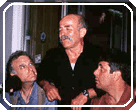
After the blessing there is a testimonial and the laying of bouquets of flowers in front of a memorial plaque which honors the women of the village. Then the several hundred men and women of Karanos make welcome nearly 1,000 guests from all over Crete as the celebration of the Cherry Festival begins. People have been preparing food for days. Rows and rows of tables are set up. We're served Saroutigana, a sweet made from deep fried, unleavened dough, shaped like a flower, coated with honey and sesame seeds. There are bottles of homebrewed raki, lemon flavored lamb stew, rice pilafi, souvlaki, salads and bowls and bowls of two kinds of cherries. There's a poetry contest and a few of the children recite some of their verses to Phil. In front of the tables is a stage and a backdrop, in the spirit of the ceiling of the Sistine Chapel depicting the hand of god giving a bunch of cherries to the hand of Adam. 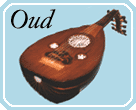
And on the stage musicians play the oud and the bouzouki, each a different kind of lute, and a lyra, a three stringed bowed instrument which sounds a bit like a violin, but it's held vertically between the knee and the left hand of a seated player. Soon after the music starts, I turn around and see Phil weeping. I ask him if he's all right. Phil tells me of the story of his grandfather, who was a lyra player and who was shot as he played, in the crossfire of a vendetta. 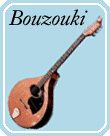
Then, as if to pull us back to the present moment, people begin to get up and dance different line dances, with the same basic form, arms on each other's shoulders. The line, which could be a dozen or more people, snakes around the stage. Sometimes it's a mix of men and women; sometimes just women and just men. The upper bodies are erect; the movement of the feet are repetitive but often quite complex. The leader sometimes seems to add improvisational steps. Then he'll go to the end of the line, so everyone has the chance to lead. The men of Crete dance like the incarnation of gods. Many of them wear black shirts and high black boots. Their bearing is relaxed, supple and strong. Sometimes they'll leap into the air and slap their heels. Now, don't get me wrong. Cretan women are gorgeous and dance beautifully, too. But there's something about seeing a relatively ordinary looking guy who might be in his fifties, even carrying a bit of paunch, come up on the dance floor, and become well, transformed. 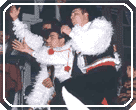
In the course of the evening, every once in a while, someone in the crowd will reach in to a shirt pocket, pull at out a semi-automatic pistol and fire off a few rounds. No one blinks. Years ago, with too many men being killed in vendettas, Cretan civilians had their guns taken away from them. This was just before the outbreak of World War II. Despite their lack of weaponry, the fierce Cretan resistance to the German occupation is legendary. Several men tell me they will never give up their guns again. It feels like I'm at the wedding of a distant relative who I've rarely seen but still have a connection to. We're treated like old friends, and even at one point, invited to join in a line dance, holding up a 20-pound bunch of cherries as the music accelerates. The dancing is over around 2 am, and Phil and I were asked if we would like to join the older men of the village as they head over to one of Karanos' two taverns to sing, drink and wait for the sun to come up. Now how can you refuse an offer like that? 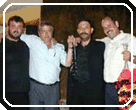
At the tavern, a dozen men are sitting around a table at an outdoor patio. They come from all levels of society. Some are farmers, some are physicians; one man is a poet. They've known each other all their lives and they are as equals. It is a night of non-stop eating, drinking, good-natured carrying on and singing. These guys know how to have a good time. The food is fabulous - cheeses, fresh bread, honey, soup and a mystery meat that turns out to be goat testicle. It's delicious by the way, who knew? But there's no time to be squeamish when someone is handing you a forkful of food and joining in the chorus of singing. The song lyrics are partly fixed, partly improvised. Here's a sample:
Phil: "When tears flow, they fall onto my chest to discover what is in my heart and if it is telling the truth." One man will begin a stanza of song, and the rest of the company is obliged to repeat it. There must be hundreds of songs many of them easily hundreds of years old. Babis Constodolykes was born in Karanos. He works nearby in the city of Chania, but returns to his home village every weekend.
Babis: "I don't know if you have been told about the Cretan songs, the local songs. They are sung by the people without instruments, whether they are in joy or in sorrow. They are called rezydika. Rezdydika means 'songs from the root of the mountain.' Reza is root. So this village, together with a few other villages around this mountain, they are called 'the villages of the reza', village of the roots. We have a few old people who continue to sing these songs and keep this tradition. And this is the most valuable heritage that we have here. For me, it's the real history of the village. In these men, the tradition continues and survives. They are the real men. In their faces we can see the past, we can see the present, and we hope that the future will learn from them, will be like them." Being a part of all this, Phil says it feels that he's come home. For me, it's like we have stepped into the pages of a Kazanzakis novel, or being morphed onto the screen with Zorba the Greek. We drink and sing through the night until the sun comes up and then incongruously, at dawn's first light, everyone at the table ends up with an ice cream pop in his hand. It is as though we have been initiated into a brotherhood. Phil and I stagger to our hotel rooms like we just stumbled out of a dream, and the dream says this is a reminder from our ancestors on how to live. It's part of our birthright. It could even be as old as the gods. In Crete, I'm Jim Metzner for The Savvy Traveler.
|
 | American Public Media Home | Search | How to Listen ©2004 American Public Media | Terms of Use | Privacy Policy |
